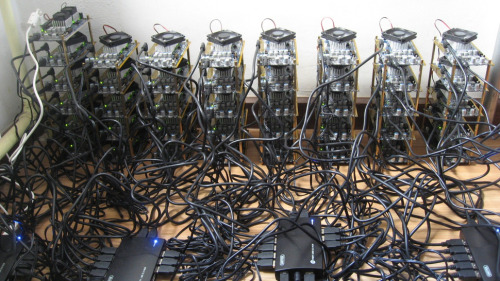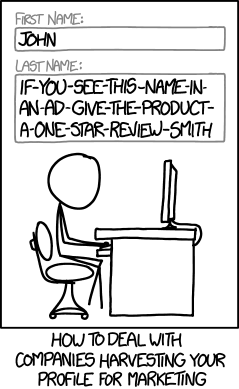Shared posts
Unmasking a pseudonymous Twitter user with machine learning
Balslevup Claus' alley...
[from tveskov] Anders Krab-Johansen on Twitter: "Det bliver en lang aften http://t.co/3Hn7FDbsgz"
Daniel Dennet on how to compose a successful critical commentary
1. You should attempt to re-express your target’s position so clearly, vividly, and fairly that your target says, “Thanks, I wish I’d thought of putting it that way.
2. You should list any points of agreement (especially if they are not matters of general or widespread agreement).
3. You should mention anything you have learned from your target.
4. Only then are you permitted to say so much as a word of rebuttal or criticism.
- Daniel Dennet
From this brain pickings blog post.
Wickr - Leave No Trace! The Internet is forever. Your private...

The Internet is forever. Your private communications don´t need to be. Wickr® is a free app that provides:
·military-grade encryption of text, picture, audio and video messages
·sender-based control over who can read messages, where and for how long
·best available privacy, anonymity and secure file shredding features
·security that is simple to use
Det handler aldrig om produktet

- Big Data-løsningen: Troen på, at kombinationen og analysen af store mængder data kan føre til den rette løsning. Men tilgangen glemmer, at det afgørende parameter er de menneskelige analyser. Data kan aldrig erstatte den unikke fortolkning.
- Steve Jobs-løsningen: Troen på, at hvis man bare opfører sig som Steve Jobs, så kommer de gode løsninger. Men tilgangen glemmer, at få organisationer minder om Apple, og ingen kan efterligne Steve Jobs.
- Customization-løsningen: Troen på, at hvis man personaliserer produkter og løsninger, så bliver kunder automatisk glade. Men tilgangen har en naiv forestilling om, hvad brugere faktisk ønsker.
- Open innovation-løsningen: Troen på, at hvis man blot involverer brugerne aktivt i co-creation, crowdsourcing osv., så kommer de gode løsninger. Men tilgangen glemmer, at kunder bare sjældent gider bruge kræfter på din virksomhed.
- Social media-løsningen: Troen på, at hvis man blot gør sine produkter sociale og shareable på tjenester som Facebook, så vil man opnå brand loyalty. Men tilgangen har en naiv forestilling om de sociale mediers effekt på folks dagligdag.


- Definer problemet, der skal løses
- Indsaml data via etnografiske metoder
- Søg efter mønstre i det indsamlede materiale
- Skab ny indsigt og konceptuelt stærk viden
- Kommuniker den nye viden, så den får forretningsmæssig værdi

- Tilgangen er ikke bred nok: Der mangler en bredere funderet tilgang til et undersøgelsesområde, der ikke kun bruger etnografiske metoder. Kritikken af Big Data er i den forbindelse skævvredet. For pointen er vel snarere, at man, med fordel, kan generere hypoteser på baggrund af store Big Data-analyser, som man bagefter kan kvalificere og undersøge i dybden med etnografien.
- Tilgangen er ikke snæver nok: Når det så kommer til analysearbejdet bliver det en smule for mystisk at tale om øjeblikkets indsigt. Det er en central pointe at møde fænomenet så fordomsfrit som muligt, men de centrale analytiske pointer dukker ikke op af sig selv. Udført godt nok vil minutiøse og systematiske analyser af datamaterialet afsløre mønstre nærmest per automatik.
- Etnografiske metoder: observere, interviewe, filme, tage billeder af, bruge feltnoter
- Rapporteringer: tykke beskrivelser, skabelsen af modeller/figurer ,
- Kontekstforståelse: analyse af, hvad der er de ydre omstændigheder i organisationer og samfund, der påvirker adfærd.
- Abduktiv metode: det vil sige, at man starter med at observere noget i verden, hvorefter man drager nogle hypoteser, som man derefter går ud og tester.
"Crowdworking is often hailed by its boosters as ushering in a new age of work. With the zeal of..."
BalslevAmazon’s Mechanical Turk may have created the most unregulated labor marketplace that has ever existed.
Crowdworking is often hailed by its boosters as ushering in a new age of work. With the zeal of high-tech preachers, they cast it as a space in which individualism, choice and self-determination flourish. “CrowdFlower, and others in the crowdsourcing industry, are bringing opportunities to people who never would have had them before, and we operate in a truly egalitarian fashion, where anyone who wants to can do microtasks, no matter their gender, nationality, or socio-economic status, and can do so in a way that is entirely of their choosing and unique to them,” asserts Lukas Biewald, the CEO of CrowdFlower, in an e-mail exchange. (CrowdFlower claims to have “among the largest, if not the largest, crowd” available, with roughly 100,000 workers completing tasks on any given day.)
But if you happen to be a low-end worker doing the Internet’s grunt work, a different vision arises. According to critics, Amazon’s Mechanical Turk may have created the most unregulated labor marketplace that has ever existed. Inside the machine, there is an overabundance of labor, extreme competition among workers, monotonous and repetitive work, exceedingly low pay and a great deal of scamming. In this virtual world, the disparities of power in employment relationships are magnified many times over, and the New Deal may as well have never happened.
As Miriam Cherry, one of the few legal scholars focusing on labor and employment law in the virtual world, has explained: “These technologies are not enabling people to meet their potential; they’re instead exploiting people.” Or, as CrowdFlower’s Biewald told an audience of young tech types in 2010, in a moment of unchecked bluntness: “Before the Internet, it would be really difficult to find someone, sit them down for ten minutes and get them to work for you, and then fire them after those ten minutes. But with technology, you can actually find them, pay them the tiny amount of money, and then get rid of them when you don’t need them anymore.”
”- How Crowdworkers Became the Ghosts in the Digital Machine | The Nation
Twitter / TheSmarmyBum: Super Bowl security headquarters...
BalslevSecurity er svært.

Twitter / TheSmarmyBum: Super Bowl security headquarters accidentally shows their wifi username and password on national television (via Aaron)
[from tveskov] Tony ville skælde autistisk pige ud men endte med at high-five hende. Hvorfor ? - MX.dk
BalslevDu vil blive overrasket over hvad min reaktion var da jeg så dette link på theoldreader.
shared: Holy Tech Batman! — Can The European Commission Be A Startup Super Hero?
BalslevToo much of European technology has been caught up producing client-driven businesses in enterprise

What is to be done with Europe? As The New York Times wrote just two days ago, there are not enough people in Europe qualified to fill all the technology jobs available. At the same time, Europe is not producing really big platforms to take on the global players. Too much of European technology has been caught up producing client-driven businesses in enterprise. As it is often said, where are the platforms like Google, Facebook and or Twitter in Europe?
“Oh, the Humanity! Uhh, I Mean, the Irony!”
Photo Credit: TheChive.Com
Sight Gag is our weekly nod to the ironic, satiric, parodic, and carnivalesque performances that are an important part of a vibrant democratic public culture. These “gags” may not always be funny or represent a familiar point of view, but they attempt to cut through the lies, hypocrisy, shamelessness, stupidity, complacency, and other vices of democratic life. Of course, we invite you to comment … and to send us images that you think might deserve a laugh or at least a wry and rueful look by those who are thinking about the character of public life today.
The post “Oh, the Humanity! Uhh, I Mean, the Irony!” appeared first on NO CAPTION NEEDED.
Download all your Gmail and Google Calendar data
The World’s Most Powerful Computer Network Is Being Wasted...

The World’s Most Powerful Computer Network Is Being Wasted on Bitcoin, via algopop
Because of the way Bitcoin self-regulates, the math problems Bitcoin mining rigs have to do to get more ‘coin get harder and harder as time goes on. Not to any particular end, but just to make sure the world doesn’t get flooded with Bitcoins. So all these computers aren’t really accomplishing anything other than solving super difficult and necessarily arbitrary puzzles for cyber money. It’s kind of like rounding up the world’s greatest minds and making them do Sudokus for nickels.
Projects like Folding@Home and SETI@Home use similarly networked power for the less-pointless practices of parsing information that could lead to more effective medicines or finding extra-terrestrial life, respectively, and either are hard-pressed to scrounge up even half of a percent of the power the Bitcoin network is rocking. And with specialized Bitcoin-mining hardware on the rise, there’s going to be an army of totally powerhouse PCs out there that are good for literally nothing but digging up cybercoins.
It’s incredible to think about the amount of power being directed at this one, singular purpose; power that’s essentially being “donated” by thousands of people across the globe just because they have skin in the game. It’s by far the most computational effort that has ever been devoted to a single purpose. And sure, Bitcoins are fine and all, but can you imagine what we could do if this energy was put behind other tough problems? We’ll you’re going to have to imagine, because so long as mining Bitcoins can earn you money and folding proteins can’t, it’s pretty clear which one is gonna get done.
"There are many, many exciting and important things we can do...
BalslevSkattefri zone på Fyn f.eks.?

"There are many, many exciting and important things we can do but we can’t do because they’re illegal or not allowed by regulations. As technologists we should have safe places where we can try out new things and figure out the effect on society and people without having to deploy into the normal world. People who like those kind of things can go there and experiment." - Larry Page
Silicon Valley’s Tech Culture: ‘We Just Want to Be Alone’ CIO.com
Er Den Perfekte Shitstorm også vores bedste vagthund?
BalslevHvis man transponerede samme historie til det Amerikanske vesten i 1860'erne, og udskifter Facebook-masserne med lynch-mobs, kunne man argumentere for at det var nødvendigt med institutioner der medierede konflikter som disse - på baggrund af lovgivning, uddannede dommere, at begge parter blev hørt etc...

På det seneste er begrebet “shitstorm” kommet i omløb blandt mennesker der beskæftiger sig professionelt med kommunikation og sociale medier. Er du en af dem, ved du hvad jeg taler om. En shitstorm er når mange brugere pludselig giver sig til at omtale en virksomhed eller en politiker negativt på netplatforme, hvor det de skriver er synligt for andre som også kan lade sig rive med. Nogle shitstorme virker velfortjente, hvis man kan holde hovedet koldt og analysere substansen, mens andre helt åbenlyst er en overdrevet og urimelig reaktion på en virksomhed eller politiker, som har gjort sit bedste og ganske enkelt bare fejlet.
Online shitstorme fungerer ikke alene. De er den del af et økosystem, hvor alene det forhold at mange mennesker foretager sig det samme på nettet, får journalister til at lugte blod og begynde at fortælle “historien”. Det kan være den om at Uffe Elbæk nu bliver trukket igennem sølet på Facebook eller at over 20.000 mennesker har “liket” en sur (og velskrevet) statusopdatering, der sviner Telenors produkter og kundeservice til. Når et hvilket som helst fænomen får likes nok, bliver det en nyhedshistorie. Hvis der findes et yderligere kriterium, har jeg endnu ikke opdaget det. Jovist – det er naturligvis en journalistisk gevinst, hvis der også er en vinkel af reel samfundsmæssig betydning. Men nødvendigt er det egentlig ikke.
Og når først journalisterne har fået færten, går det lynstærkt. Inden for en time har 20-30 af landets største websites omtalt og linket til det omtalte stykke indhold (som vi, for at blive i metaforen, passende kan kalde “lorten”). Og så begynder historien for alvor at tiltrække sig opmærksomhed. Og pressens arbejdsmænd og kvinder – som ved hjælp af en eller anden meget effektiv fortrængingsmekanisme, synes at kunne forblive blinde over for deres egen rolle i den slags fænomener – kan nu følge historien op med flere historier om dagens virale fænomen, som bare ingen ende vil tage.
Den perfekte shitstorm er nu en realitet.
Den koster de involverede virksomheder formuer og ministre deres embede. Men bare få dage efter er stormen blæst over og alle taler nu om noget andet. For eksempel om en fed koreaner som danser pudsigt. Og medierne genlyder nu af frydefuld undren over at den video virkelig kan få så mange views, når nu der kun er flere millioner journalister, der linker det dette spændende virale fænomen fra deres avisers websites. Ja, det er da også ganske mageløst. Hvem kan forklare dette uforklarlige virale fænomen. Nogen MÅ da fortælle historien.
Imens samler ministeren sit liv og sin karriere op fra rendestenen og virksomheders ry er blevet sværtet, så de må bruge millioner på at relancere sig. Som f.eks. Telenor, der nu kalder det samme produkt de hele tiden har solgt for “nu”, på alle reklameflader du kan tænke dig.
Måske der så dukker en avisartikel eller et indslag i Deadline op, som handler om disse vanvittige menneskemænger adfærd – eller man ringer til en internetpsykolog og spørger, hvad der dog får folk til den slags sindssyge ting. Og når det sker, er det fristende at se dette som en fejl ved systemet og begynde at tale om “den indre svinehund” og deltage i en ekspedition ud på brugerfladerne og ned i fokedybet, for at finde ud af hvad der dog kan få folk til at faile sådan.
Og det har jeg naturligvis også gjort. Jeg har talt om massepsykologi og om hvordan 3 ting typisk skal være til stede for at vække en shitstorm:
- En magtfuld virksomhed, instans eller person
- En helt konkret sag med et uskyldigt offer
- En sjov, skarp og velskrevet tekst, der langer ud efter magten og forsvarer offeret
Prøv selv at skrive en statusopdatering på Facebook efter denne formel (hvis du altså kan skrive sjovt og skarpt) og du vil blive overrasket over resultatet. Ja hvis du efter tredje afsnit af denne blogpost fik en trang til at dele den, så er det samme mekanisme der gør sig gældende. “Så kan de medløbende journalister da bare lære det!!”
Men hvad nu hvis svinehunden er vores bedste vagthund?
Intet er nemmere end at stå på sideinjen og pege fingre af masserne, når de i misforstået retfærdighedssans går amok på en næsten sagesløs virksomhed eller offentlig, magtfuld person. Selve ordet “shitstorm” er jo et ret godt eksempel på den slags latterliggørelse. Men da jeg tidligere på året blev interviewet til en artikel i “Journalisten”, hørte jeg pludselig mig selvfremlægge et synspunkt, jeg ikke har kunnet slippe siden. Jeg begyndte nemlig at se disse “shitstorms”, som en negativ sideefekt af et langt større og helt uundværligt fænomen.
Vi har alle lagt store dele af vores liv og data i hænderne på store magtfulde virksomheder, som teknologisk og forretningsmæssigt er så langt forud for enhver lovgivning at vi er prisgivet deres hæderlighed og vilje til at varetage vores interesser. Og det eneste disse virksomheder er bange for, er at masserne skal gå amok på dem og skade deres aktiviteter eller ligefrem umuliggøre dem. Man kan altså se den lurende online pøbel, ikke som en svinehund, men som en vagthund, som holder de magtfulde i skak, når ingen andre gør det. Det er en vagthund der levendegøres af dig, mig og pressen. Desværre er denne vagthund ikke særligt begavet. Den lever af uretfærdighed, likes og simple budskaber og kan finde på at kaste sig galpende ud af hundehuset, med savlen svingende fra gabet, og sætter tænderne i forbipasserende, bare den lugter noget der ligner en uretfærdighed.
Det er denne nærsynede og hyper-sensitive vagthund, der fik Palads Teatret til at gå ud og undskylde at de havde formastet sig til at skrive et opslag der omtalte det faktum at afslutningen af ramadanen ofte fejres med en bigraftur af unge muslimer, hvilket godt kan gå lidt heftigt for sig. Noget der i hvert fald i mine øjne var totalt urimeligt og overdrevet. Men det er også den vagthund der holder Facebook og Google i ave og er vores eneste værn imod markedets overmagt.
Som jeg blev citeret for at sige, i Journalistens artikel:
»Det kan godt være, at netbrugerne er som en doberman på 45 kopper kaffe, men det er den samme maskine, der gør, at store virksomheder tænker sig om mange gange, før de gør noget, de ikke skal. Så isoleret kan man sige, at overreaktionen virker dum og uproduktiv, men ser man hypersensitiviteten i en større sammenhæng, så vil jeg nødigt undvære den, for alternativet er værre.«
Medium buys MATTER
It's All About Perspective
Submitted by: Unknown
Tagged: snow , comics , perspective , g rated , Parenting FAILS Share on Facebookshared: Smartphone apps sense users’ emotions and quantify wellbeing
BalslevEn app der hjælper dig med at finde ud af hvordan du har det.

The increasing power of smartphones enable users to monitor even the smallest details of their lives, from teeth cleaning routines to skin quality. Now two ventures – the UK’s EI Technologies and Soma Analytics from Germany – are offering tools for accurately tracking mood over time.
EI Technologies hopes to launch Xpression – an app that uses some of the native features of smartphones to detect when their owners are feeling happy or stressed – to the public once it has trialled it in healthcare settings.
Wireframe Tee
Balslevnice...
Wireframe Tee: Hierarchy, flow, function, space.
"Robert Edwards had been on the popular dating site OKCupid.com for about six months when the..."
BalslevVi outsourcer moderator-rollen!
Robert Edwards had been on the popular dating site OKCupid.com for about six months when the administrators asked him to be a community moderator. “They wrote and said I am a responsible user, whatever that means,” he recalled, admitting that at first he was befuddled. Though fairly active on the site, Edwards, a medical professional who lives in the Mission District, had remained a confirmed bachelor.
But curiosity drove him to click the “moderation” button, and within minutes he was reading people’s messages to each other and perusing profiles flagged for possible terms of service violations.
Online love-seekers might not be aware of it, but OKCupid has deputized random strangers to gain access to intimate conversations between others — correspondence that many users, as well as Internet privacy experts, assumed to be private.
”- Testing Online Privacy Limits, OKCupid Lets Strangers Read Intimate Messages | San Francisco Public Press
Marina Abramovic and Ulay
BalslevRørende...
I was moved to tears last night while watching this moment between the artist Marina Abramovic and her former love Ulay. Apparently they started an intense love story in the 70s and when they felt the relationship had run its course, they decided to walk the Great Wall of China, each from one end, meeting for one last big hug in the middle and never seeing each other again.
During her 2010 MoMA retrospective Ulay arrived without her knowing and this is what happened. Really moving.
(via Zen Garage)
Google Keep
Trust your thoughts and ideas to the makers of Google Reader. Good luck with that.
★Sorry Google; you can Keep it to yourself
Google today launched Keep, an app that allows you to save things, clip stuff from the web, hoard notes and what not and put them all onto your Google Drive. Yup, you guessed it — it is an imitation to Evernote and many other such applications. It is a good thing that Google has decided to compete with the likes of Evernote — it validates their market.
It might actually be good, or even better than Evernote. But I still won’t use Keep. You know why? Google Reader.
I spent about seven years of my online life on that service. I sent feedback, used it to annotate information and they killed it like a butcher slaughters a chicken. No conversation — dead. The service that drives more traffic than Google+ was sacrificed because it didn’t meet some vague corporate goals; users — many of them life long — be damned.
 Looking from that perspective, it is hard to trust Google to keep an app alive. What if I spend months using the app, and then Google decides it doesn’t meet some arbitrary objective? Evernote has my data and frankly, I’m glad to pay them to keep it because they are who they are. One of the reasons I use Evernote is because it is their only thing. (For now.) Evernote is focused on making the service better. And it keeps that focus every year.
Looking from that perspective, it is hard to trust Google to keep an app alive. What if I spend months using the app, and then Google decides it doesn’t meet some arbitrary objective? Evernote has my data and frankly, I’m glad to pay them to keep it because they are who they are. One of the reasons I use Evernote is because it is their only thing. (For now.) Evernote is focused on making the service better. And it keeps that focus every year.
Evernote is like Derek Jeter, playing shortstop and trying to win every day. Google? It is the digital Mr. Ripley.
Sorry Google, but you might not realize that you are acting like the company you wanted to replace: Microsoft. The Barons of Redmond used to float products into the market — smart displays and weird stuff — that companies like Samsung and LG would put out in the market, only to yank them later. In the end, I stopped believing in Microsoft and shifted my dollars and attention to other brands.
And by the way – how is this app strategic for you guys and Reader is not? A little clarity would certainly be appreciated.
How about a pledge? If you build it, we use it, and you use our personal data to make your other products better or your ad sales executives richer, then you will keep it around.
Image courtesy of Flickr user Dano
Related research and analysis from GigaOM Pro:
Subscriber content. Sign up for a free trial.
Tools, platforms, and Google Reader
There are tools, and there are platforms. Tools tend to be simple things. They help you get some particular task done — they lend you their power when you need it — but they otherwise pretty much stay out of your life. They’re like little amplifiers of the self. Platforms are more complicated. They may help you do some of the same things that tools help you do, but, in granting that assistance, they demand that you become entangled in a bigger scheme, a scheme of someone else’s devising. Rarely do you know fully what the scheme consists of, what its ends are, or how it will develop in the future. A tool holds no secrets; a platform holds many. You use a tool; a platform uses you.
RSS is a good tool. It gives you a simple way to shape and filter the web’s content to suit your own needs. It lends you its power when you need it without requiring any broader entanglement. Its developers, to their credit, made its simplicity central. They were acting as tool-makers, which is how software programmers and web developers tended to act a decade ago. That was before the platform-builders arrived, with their schemes.
Google was once a tool-maker. Now, it’s a platform-builder. Like Facebook. Like Apple. Like Microsoft. Like Twitter. Like all the rest. And so Google is officially killing off its popular RSS tool Google Reader. The move was in the cards ever since the creation of the Google+ platform. Tools are threats to platforms because they give their owners ways to bypass platforms. If you have a good set of tools, you don’t need a stinking platform. If you’re happy with RSS, you’re a little less likely to sign up for Google+, or Twitter, or Facebook. At the very least, the tool gives you the choice. It grants you self-determination.
RSS, like other web tools and even other personal-computer tools, is doomed—not doomed, necessarily, to disappear, but doomed to be on the periphery, largely out of sight. “We’re living in a new kind of computing environment,” said Google engineer Urs Hölzle in announcing that Google Reader would be swept away in a “spring cleaning.” He’s right. The tool environment is gone. The platform environment is here. Consider yourself entangled.
Photo by Julia Manzerova.
Evgeny’s little problem
BalslevLæs kommentarerne!
Ian Tucker has a good interview with Evgeny Morozov in the Observer. I was really struck, though, with Morozov’s reply to a question about how he manages his net use:
I have bought myself a type of laptop from which it was very easy to remove the Wi-Fi card – so when I go to a coffee shop or the library I have no way to get online. However, at home I have cable connection. So I bought a safe with a timed combination lock. It is basically the most useful artefact in my life. I lock my phone and my router cable in my safe so I’m completely free from any interruption and I can spend the entire day, weekend or week reading and writing. … To circumvent my safe I have to open a panel with a screwdriver, so I have to hide all my screwdrivers in the safe as well. So I would have to leave home to buy a screwdriver – the time and cost of doing this is what stops me.
User!
Seriously, I’ve always been uncomfortable with the application of the term “addiction” to describe compulsive net use. But having read that, particularly the bit about the screwdrivers, I am now officially changing my mind. By all means, add an entry for “internet addiction” to the DSM — and hurry up about it. I mean, reread that passage, but replace “my phone” with “liter of vodka” or “router cable” with “crack pipe.” It’s textbook, right down to Morozov’s immediate attempt to deny what he’s just confessed: “It’s not that I can’t say ‘no’ to myself.” I’m surprised he didn’t say, “I never do more than a gigabit before breakfast.”
Now, where can I buy one of those safes?
UPDATE: In a subsequent interview, with Gawker, Morozov justifies his obsession: “Believe me, I’ve gone through all the necessary literature in moral philosophy and I still don’t see a problem.”
Photo by David Morris.
On Feb. 26, Denmark’s TV2 needed an over-the-shoulder shot for a report on the conflict in...
BalslevDet er ikke kun Tv2 der bruger Google image search.

On Feb. 26, Denmark’s TV2 needed an over-the-shoulder shot for a report on the conflict in Syria, and some production assistant gave the control room a screengrab from the original Assassin’s Creed (which features the city prominently) Apparently it’s this one, from the game’s unofficial wiki site. That’s supposed to be the city’s skyline as it appeared about 720 years ago, by the way.
Someone Put an Assassin’s Creed Screengrab In a TV Report on Syria - Kotaku (via Tom A)

For a piece on Amnesty and the United Nations Security Council’s response to events in Syria last week, it seems the BBC’s production crew needed a graphic for the international body. So they went to Google. And got…well, what they thought was the logo for the UN’s Security Council (which doesn’t really have one), but which in fact is the logo of the United Nations Space Command, humanity’s protectors in the Halo universe.
The BBC Might Have Confused Halo With the United Nations - Kotaku
"You can hijack an offshore business in four easy steps, and then start to save money on your tax..."
BalslevSproget er en dynamisk størrelse.
- Loophole for All - Became a pirate, hijack an offshore company!






